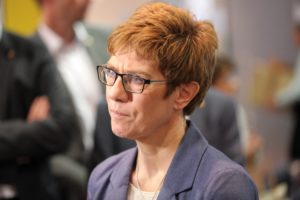The Special Forces Command (KSK) of the German Armed Forces is facing its worst crisis yet. Defense Minister Annegret Kramp-Karrenbauer now wants to take various measures to remove the breeding ground for right-wing extremist tendencies within the unit. She still does not rule out a complete disbandment.
In direct comparison with other units of the German armed forces, the Special Forces Command (KSK) is still quite young. The unit was set up in September 1996 because it had become clear that the German armed forces lacked a unit capable of rescuing citizens and soldiers from dangerous situations. The KSK is stationed in Calw in the Black Forest, but the hunt for war criminals, in which the special unit is often deployed, has resulted in missions all over the world.

In 2020, the KSK is now facing the most serious crisis in its history: parts of the unit have clearly drifted to the right and extremist tendencies have developed that lie outside the German constitution. However, the existence of such tendencies has not only been clear since May, when various weapons were found on the private property of a KSK sergeant major. “The escalation of events within the KSK with regard to extremist tendencies has its visible origins in 2017,” states the report of the Special Forces Command working group. The report refers to a farewell party for the company commander of the 2nd Company, at which several KSK soldiers are said to have shown the Hitler salute. Federal Defense Minister Annegret Kramp-Karrenbauer now wants to do all she can to combat right-wing extremism within the Bundeswehr. “If those who stand for a defensive democracy, if those who take an oath of office or pledge to uphold the constitution, who are prepared to risk life and limb in case of doubt, and this applies in particular to the KSK, if those in their own ranks have cases, men and women who fight against this constitution, who are recognizably right-wing extremist, then this endangers the stability of the entire democracy,” she explained in the ARD summer interview. Taking action against such tendencies is therefore “the task of all of us” and “mine in particular”, she adds. A tightrope act, as it soon turned out, because the Bundeswehr does not want to do without the capabilities of the KSK under any circumstances. Nevertheless, right-wing extremist tendencies in the Bundeswehr are not to be tolerated under any circumstances – their breeding ground is to be unconditionally removed. Together with a working group led by Inspector General Eberhard Zorn, structural measures have therefore been drawn up that should bring results on several levels. For example, Kramp-Karrenbauer wants to completely disband the 2nd Command Company of the KSK, as this company was identified by the working group as the nucleus of right-wing extremism within the KSK. In addition, however, the training of KSK soldiers must also be reformed. The compartmentalization of the unit, which has little contact with other units of the Bundeswehr, would have encouraged the hardening of such thought constructs. However, a complete dissolution of the KSK cannot be ruled out, says the Minister. “If the KSK’s self-cleaning powers in particular do not have sufficient effect, the question will inevitably arise as to whether the KSK can remain in its current form at its current location.”
Here to our other “heads of the week”.










